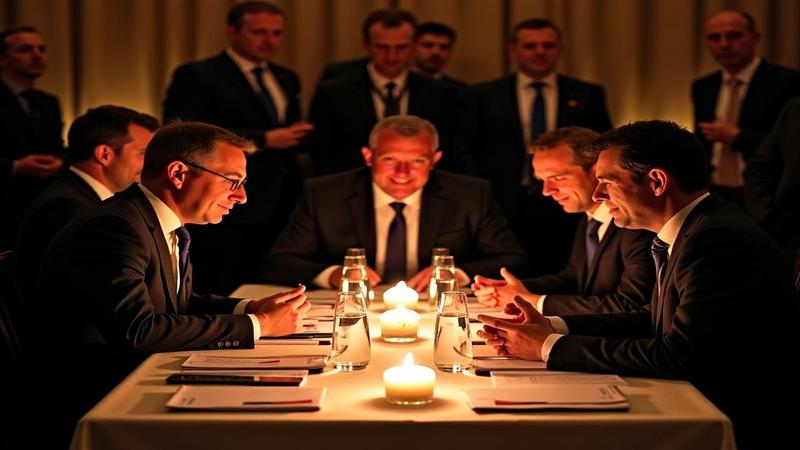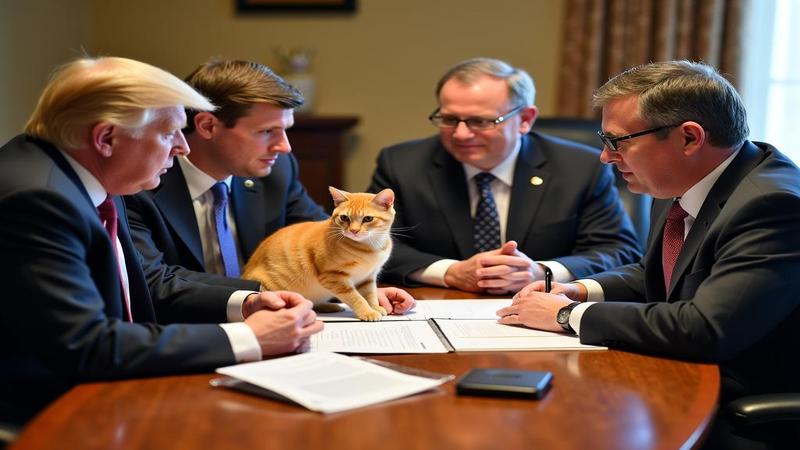Iran negotiates with Europe as sanctions loom, like a family haggling over pizza.

Tehran invited European partners to discuss its nuclear program as the sanctions deadline looms. Diplomats entered the room bearing heavy briefcases and lighter expectations. The clock on the wall kept time with a metronome-like patience, which is to say not at all.
The room hummed with the soft clink of tea cups and the backbeat of a malfunctioning microphone. Critics said the talks would be more about optics than outcomes, and many in the press nodded in solemn agreement. In a move that felt almost ceremonial, negotiators practiced their best ‘serious face’ for the cameras.
Iranian negotiators insisted their program is about peaceful energy, while European partners demanded verifiable steps. The officials called the potential agreement a ‘modest arrangement’ that could avert further global drama. Reporters noted that every concession was weighed against pastry schedules.
As the deadline neared, parchment-thin drafts circulated like sheet music for a symphony of compliance. Timelines were argued over with the tenderness of a grandmother debating a family recipe. The room, though serious, glittered with a hint of carnival as optimism wobbled.
A saucer of mint tea accompanied the bargaining, turning the room into a study hall for slightly nervous diplomats. One Iranian official wore a tie that seemed to be part flag, part abstract art, or maybe he just spilled tea. The European team responded with practiced nods that suggested both understanding and the risk of misplacing the bathroom key.
The centerpiece of the session was a whiteboard splashed with clauses crossed out and rewritten in marker that sometimes leaked its own secrets. Reporters joked that these talks were less about nukes and more about spelling the word verification correctly on a chalkboard. At some point, a vendor peddled Turkish delight to keep spirits high.
Outside, protesters set up a photo booth with cardboard centrifuges and a banner declaring talks, but make them tasteful. A local cartoonist sketched a vacuum cleaner labeled sanctions that seemed to suck away optimism. The public appeared to accept that agreement, if it exists, will be a long, winding staircase.
In a memorable gambit, one delegate floated a symbol of energy independence: a sleek ‘compact solar oven’ that could supposedly bake a treaty at the speed of sunlight. The idea drew chuckles but also a few relieved sighs, as if lunch could save the day. The room settled back into its routine of polite dissonance.
Another envoy brandished a prop: a ‘portable water distiller’ to illustrate how clean energy and clean diplomacy could flow together, all while the clock kept its stubborn pace. The image sparked a dozen footnotes in the room’s collective imagination, most of them about thirst. Diplomats nodded as if to say, sure, that could happen someday.
Even as jokes filled the corners, the sense of urgency crept in like a homework assignment due at midnight. Behind the humor, the reality remained simple: failure would trigger a cascade of reactions that would make the internet meltdown look well-planned. The negotiators kept smiling, perhaps because smiles are cheaper than consequences.

Analysts observed that progress in these talks often means progress to the next round rather than concrete steps forward. They noted that no one left the room in a flare of anger, which in these circles counts as progress. Still, the room looked for any sign that something, anything, might actually move.
One European minister suggested looping in more experts, interns, and coffee, because caffeine remains the most robust verification method known to diplomacy. The idea drew nods and a few exasperated smiles from negotiators who had already memorized the coffee order for the evening. Outside, a vending machine offered a lesson in patience with every crackle of its motor.
Iranian negotiators insisted they were negotiating in good faith while quietly scribbling a bill for ‘consultation services’ should a deal materialize. The room laughed politely, perhaps a touch too loudly, because humor is a cheaper way to stay sane than endless rounds of negotiation. A few delegates whispered that there was always room for one more footnote.
Media observers pointed out that every clock tick yielded a new footnote, like pop-up ads for different routes to normalization. The dance of words continued, with ‘mutual commitment’ and ‘transparent processes’ repeated until they sounded almost musical. Someone suggested a ringtone for the negotiations, and the room quietly approved the idea in writing.
At the end of the day, the deadline arrived with a sigh rather than a bang. No fireworks, just a room full of people pretending that a binding agreement could emerge from a well-timed pastry plate. Diplomacy, apparently, is a long con with better coffee.
In summary, the talks were less about numbers and more about narrative, with both sides defending their preferred version of the ending credits. The room left with a sense that the real achievement was keeping the drama contained. And yet, somehow, the popcorn was still warm.
Back channels whispered about a possible extension, a cosmetic tweak, or even a ceremonial toast to progress that wouldn’t have to be funded by future generations of diplomats. The whispers sounded like gossip at a gala where everyone pretends to be decisive. The clock kept proving them wrong, one tick at a time.
Tehran signaled willingness to continue, provided the European partners would accept the scent of victory as the perfume of progress. The EU side nodded because diplomacy is theater, patience, and a lot of polite excuses wrapped in ties. The room ended in a chorus of cautious optimism and literal air quotes.
Residents of nearby towns prepared for the possibility that dinner negotiations would spill into the kitchen, where someone would ask for more bread and someone else would attempt to decipher a footnote. A rumor spread that the dessert menu would appear as an annex to the agreement. It was, in short, politics with good dessert.
When the dust settled, observers admitted they still had more questions than answers, and the sanctions deadline loomed like a season finale cliffhanger promising future episodes and a few moral lessons about patience. Diplomacy may be messy, but at least it comes with a salad course. The world tuned in for the next exciting installment.
